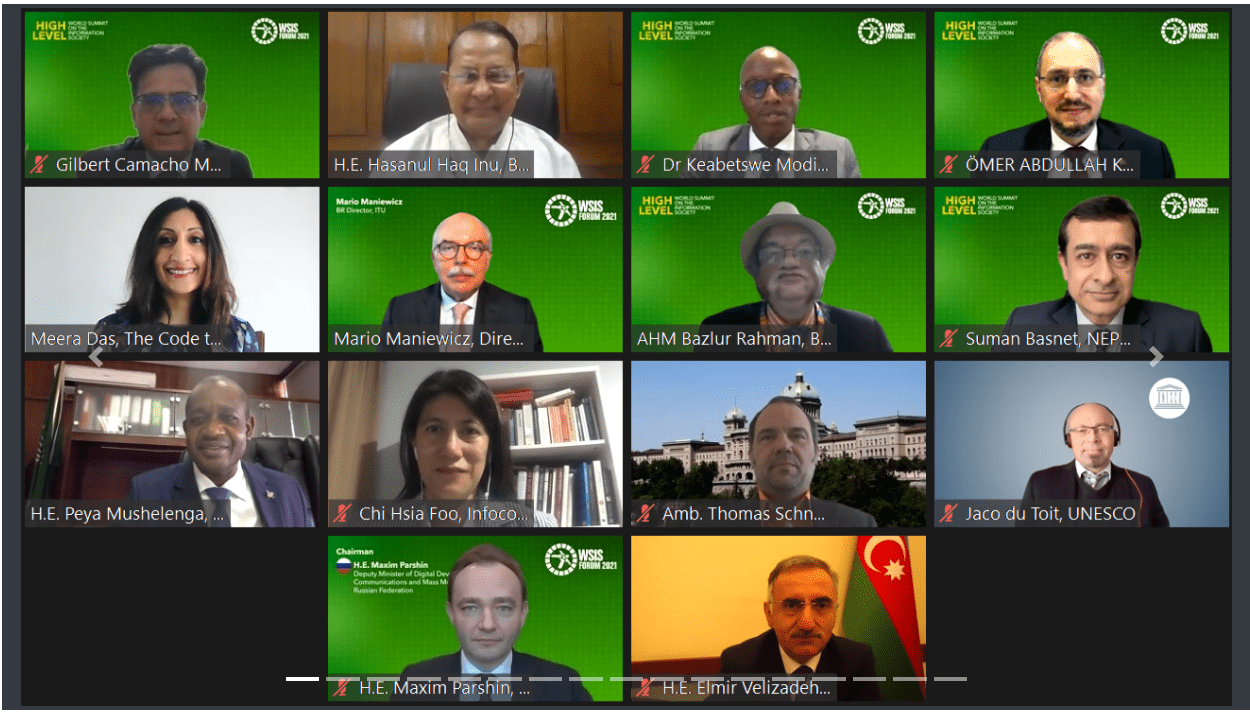The World Summit on the Information Society (WSIS) Forum 2021 was organised in a virtual format by ITU as the lead coordinator, in collaboration with the co-organisers UNESCO, UNCTAD, and UNDP, and in close collaboration with more than 30 UN agencies. The WSIS Forum 2021 provided an inclusive global multistakeholder platform for all to exchange knowledge and information, enhance collaborative networks, and to share best practices in the information and communication technologies (ICTs) sector.
The Forum’s theme this year, “ICTs for Inclusive, Resilient and Sustainable Societies and Economies (WSIS Action Lines for achieving the Sustainable Development Goals)” created an opportunity for WSIS stakeholders to share their efforts and innovative ideas to leverage the (ICTs). Also, it built momentum to advance action-oriented dialogue on efforts in the context of COVID-19 recovery and initiatives to implement the WSIS Action Lines to advance the United Nations’ Sustainable Development Goals (SDGs).
Over the course of seventeen weeks (since January 2021), the WSIS Forum 2021 hosted more than 250 sessions, including workshops, live interviews, WSIS TalkX, the high-level track, Hackathon and many more. The WSIS Forum 2021 garnered a lot of interest and excitement worldwide – with a cumulative attendance of over 50,000 attendees (zoom room, zoom recording, Facebook Live videos, YouTube, and other format) over 185 countries from Government, Civil Society, Academia, Private Sector, the UN to exchange discourse on ICTs emerging issues to strengthen information and knowledge societies.
High-Level Policy Sessions Highlights
Between 22 and 26 March, more than 1550 participants have joined us for 11 High-Level Policy sessions of the WSIS Forum 2021. This year’s sessions have covered a wide range of topics including Bridging digital Divides, ICT Applications and Services, Building confidence and security in the use of ICTs, Enabling Environment, Ethical Dimensions of the Information Society, e-Trade, Capacity building, e-Learning and Gender Mainstreaming and ICTs.
More than 100—Ministers, Deputies, Head of Regulatory Agencies and High-Level Representatives representing Private Sector, Academia, International Organizations, Technical Community and Civil society joined with some joining for the first time, especially from the Americas region, including Ministers and Regulators from Trinidad and Tobago, Nicaragua, Uruguay, United States (Chairwoman), Jamaica and Peru.
In addition to successful participation of Ministers and Regulators, a cross sectoral approach was engaged with the participation of Ministers and High-Levels form other sectors.
WSIS Action Lines Facilitators provided a context to how UN Agencies are implementing the WSIS Action Lines.
Many high-level participants emphasised on the importance of bridging the digital divide where 3 High-Level Policy Sessions focusing on this theme. Let us remember that 3.6 billion people around the world are still not connected to the Internet, mostly those living in rural areas and remote communities, our core mission must be to connect everyone everywhere.
Throughout the sessions, some countries shared their efforts to respond to and cope with the impact of COVID-19. It was emphasised that we need to leverage the potential of ICTs towards combating the pandemic. It is now well recognized that ICTs are a key part of building back better, for more inclusive healthcare and education, more sustainable business practices, and for the implementation of the SDGs.
The WSIS Forum remains the platform to track the implementation of the WSIS Action Lines to achieve the Sustainable Development Goals, in collaboration with partner UN Agencies.
The summary of the High-Level Policy sessions will be included in the “WSIS Forum 2021 High-Level Outcomes and Executive Brief” and will also be presented by the High-Level Track Facilitators during the “Outcomes of the High-level Policy Sessions and Conclusion of High-Level Track by Chairman” session scheduled on May 20. The Final Week of the Virtual WSIS Forum 2021, will take place from 17 to 21 May 2021, featuring an Opening segment, a closed Ministerial Round Table meeting, and High-Level dialogues.
